Module Reflection: Introspection on Health, Illness, Dying, Death
VerifiedAdded on 2023/04/23
|5
|1250
|139
Journal and Reflective Writing
AI Summary
This assignment is a reflective piece where the student explores the meaning of health, illness, dying, and death, drawing upon personal experiences and insights gained from various articles and perspectives. The student analyzes the impact of illness on patients, their families, and healthcare professionals, and reflects on how these experiences have shaped their understanding of patient care and the importance of emotional and psychological support. The assignment emphasizes the significance of coping mechanisms, therapeutic relationships, and the patient-centered approach in healthcare, incorporating relevant nursing theories and personal observations. The student concludes by articulating a commitment to providing supportive care and fostering a strong will to live for patients facing health challenges. The assignment includes references to support the arguments and insights provided.
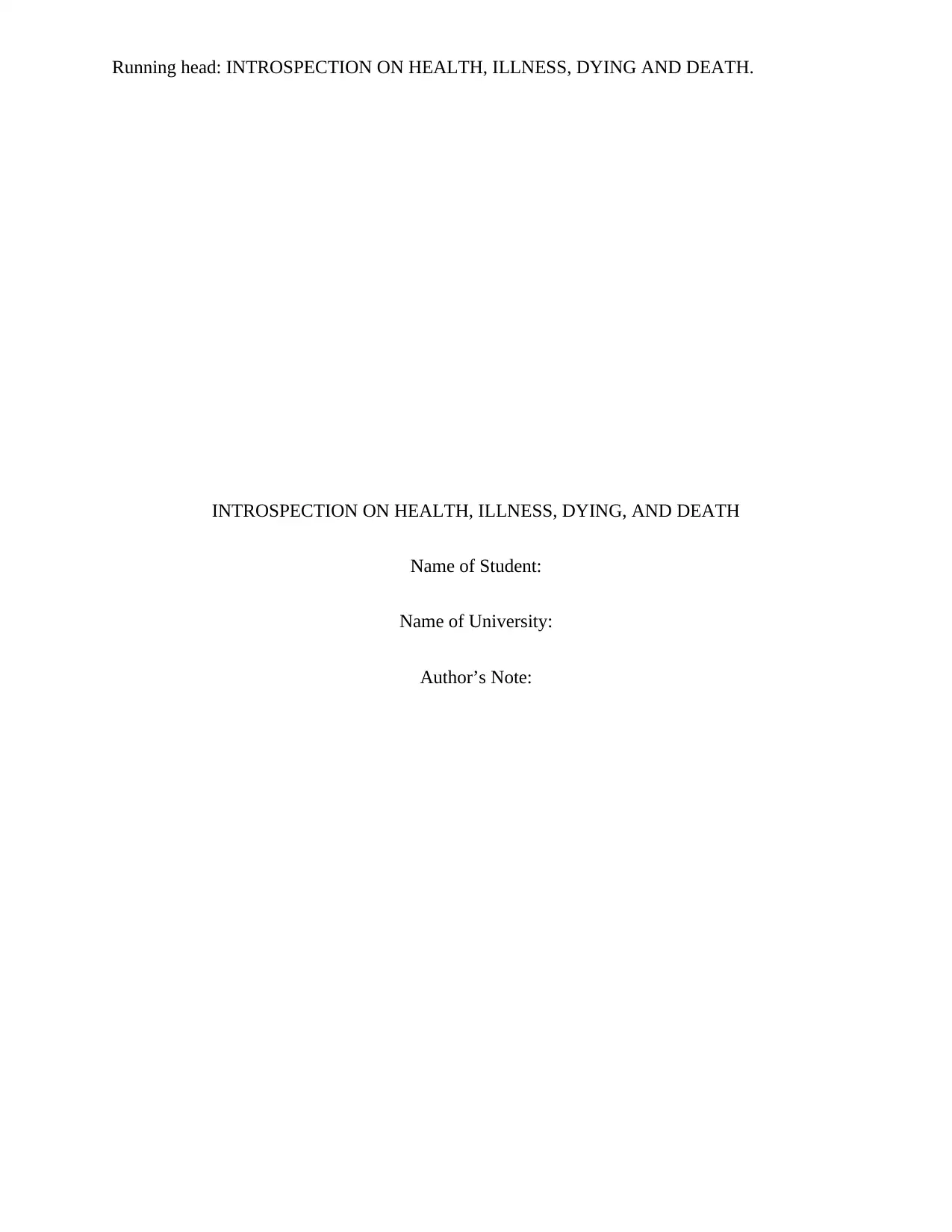
Running head: INTROSPECTION ON HEALTH, ILLNESS, DYING AND DEATH.
INTROSPECTION ON HEALTH, ILLNESS, DYING, AND DEATH
Name of Student:
Name of University:
Author’s Note:
INTROSPECTION ON HEALTH, ILLNESS, DYING, AND DEATH
Name of Student:
Name of University:
Author’s Note:
Paraphrase This Document
Need a fresh take? Get an instant paraphrase of this document with our AI Paraphraser
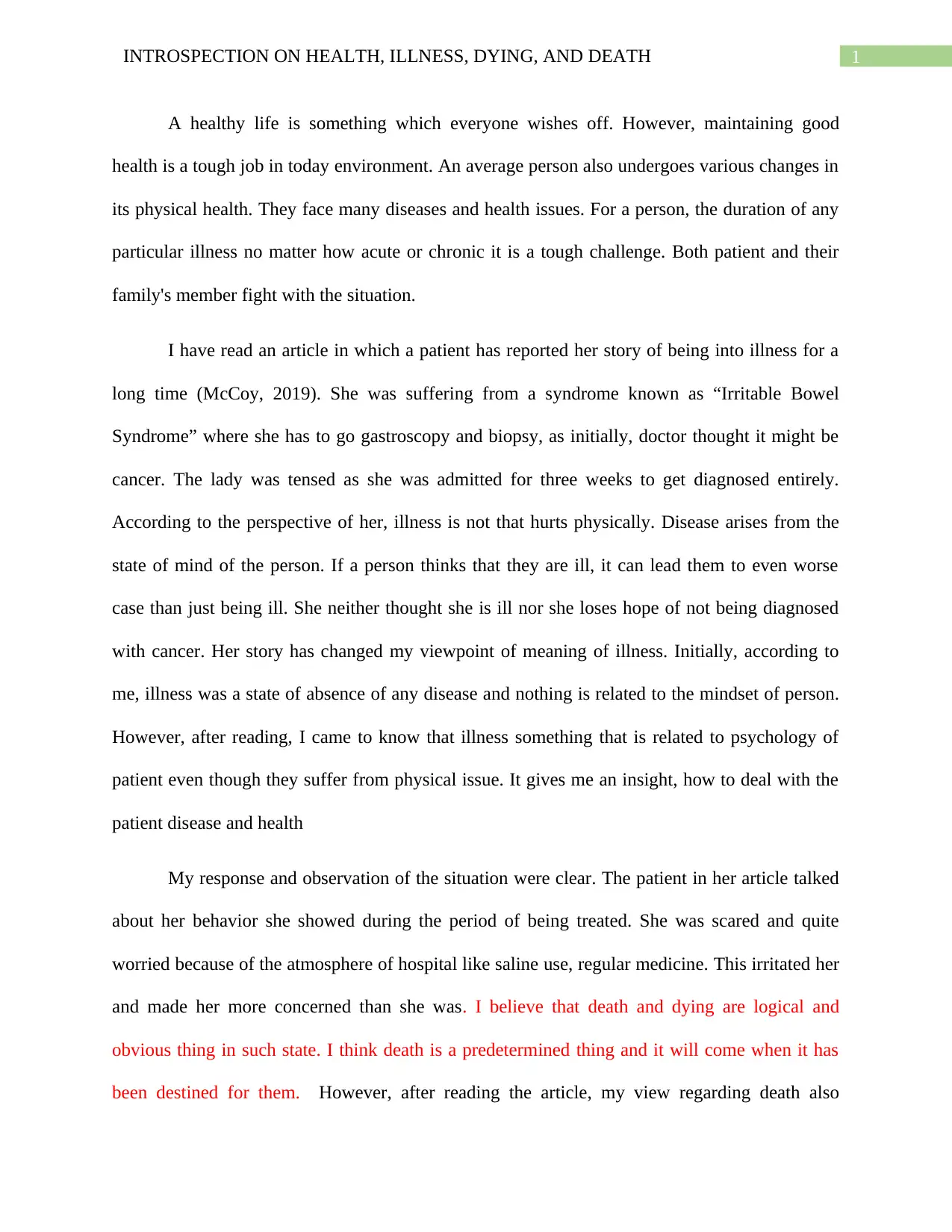
1INTROSPECTION ON HEALTH, ILLNESS, DYING, AND DEATH
A healthy life is something which everyone wishes off. However, maintaining good
health is a tough job in today environment. An average person also undergoes various changes in
its physical health. They face many diseases and health issues. For a person, the duration of any
particular illness no matter how acute or chronic it is a tough challenge. Both patient and their
family's member fight with the situation.
I have read an article in which a patient has reported her story of being into illness for a
long time (McCoy, 2019). She was suffering from a syndrome known as “Irritable Bowel
Syndrome” where she has to go gastroscopy and biopsy, as initially, doctor thought it might be
cancer. The lady was tensed as she was admitted for three weeks to get diagnosed entirely.
According to the perspective of her, illness is not that hurts physically. Disease arises from the
state of mind of the person. If a person thinks that they are ill, it can lead them to even worse
case than just being ill. She neither thought she is ill nor she loses hope of not being diagnosed
with cancer. Her story has changed my viewpoint of meaning of illness. Initially, according to
me, illness was a state of absence of any disease and nothing is related to the mindset of person.
However, after reading, I came to know that illness something that is related to psychology of
patient even though they suffer from physical issue. It gives me an insight, how to deal with the
patient disease and health
My response and observation of the situation were clear. The patient in her article talked
about her behavior she showed during the period of being treated. She was scared and quite
worried because of the atmosphere of hospital like saline use, regular medicine. This irritated her
and made her more concerned than she was. I believe that death and dying are logical and
obvious thing in such state. I think death is a predetermined thing and it will come when it has
been destined for them. However, after reading the article, my view regarding death also
A healthy life is something which everyone wishes off. However, maintaining good
health is a tough job in today environment. An average person also undergoes various changes in
its physical health. They face many diseases and health issues. For a person, the duration of any
particular illness no matter how acute or chronic it is a tough challenge. Both patient and their
family's member fight with the situation.
I have read an article in which a patient has reported her story of being into illness for a
long time (McCoy, 2019). She was suffering from a syndrome known as “Irritable Bowel
Syndrome” where she has to go gastroscopy and biopsy, as initially, doctor thought it might be
cancer. The lady was tensed as she was admitted for three weeks to get diagnosed entirely.
According to the perspective of her, illness is not that hurts physically. Disease arises from the
state of mind of the person. If a person thinks that they are ill, it can lead them to even worse
case than just being ill. She neither thought she is ill nor she loses hope of not being diagnosed
with cancer. Her story has changed my viewpoint of meaning of illness. Initially, according to
me, illness was a state of absence of any disease and nothing is related to the mindset of person.
However, after reading, I came to know that illness something that is related to psychology of
patient even though they suffer from physical issue. It gives me an insight, how to deal with the
patient disease and health
My response and observation of the situation were clear. The patient in her article talked
about her behavior she showed during the period of being treated. She was scared and quite
worried because of the atmosphere of hospital like saline use, regular medicine. This irritated her
and made her more concerned than she was. I believe that death and dying are logical and
obvious thing in such state. I think death is a predetermined thing and it will come when it has
been destined for them. However, after reading the article, my view regarding death also
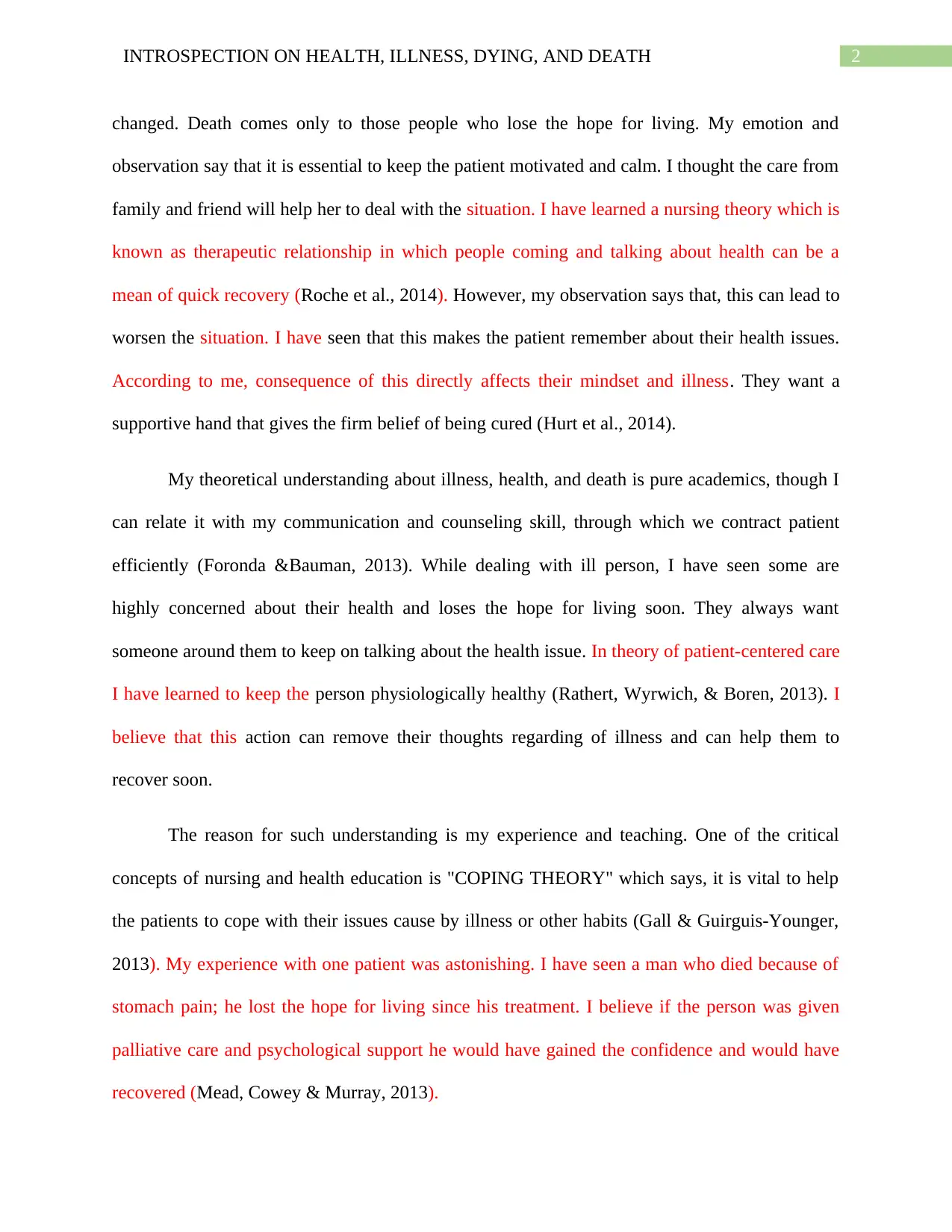
2INTROSPECTION ON HEALTH, ILLNESS, DYING, AND DEATH
changed. Death comes only to those people who lose the hope for living. My emotion and
observation say that it is essential to keep the patient motivated and calm. I thought the care from
family and friend will help her to deal with the situation. I have learned a nursing theory which is
known as therapeutic relationship in which people coming and talking about health can be a
mean of quick recovery (Roche et al., 2014). However, my observation says that, this can lead to
worsen the situation. I have seen that this makes the patient remember about their health issues.
According to me, consequence of this directly affects their mindset and illness. They want a
supportive hand that gives the firm belief of being cured (Hurt et al., 2014).
My theoretical understanding about illness, health, and death is pure academics, though I
can relate it with my communication and counseling skill, through which we contract patient
efficiently (Foronda &Bauman, 2013). While dealing with ill person, I have seen some are
highly concerned about their health and loses the hope for living soon. They always want
someone around them to keep on talking about the health issue. In theory of patient-centered care
I have learned to keep the person physiologically healthy (Rathert, Wyrwich, & Boren, 2013). I
believe that this action can remove their thoughts regarding of illness and can help them to
recover soon.
The reason for such understanding is my experience and teaching. One of the critical
concepts of nursing and health education is "COPING THEORY" which says, it is vital to help
the patients to cope with their issues cause by illness or other habits (Gall & Guirguis-Younger,
2013). My experience with one patient was astonishing. I have seen a man who died because of
stomach pain; he lost the hope for living since his treatment. I believe if the person was given
palliative care and psychological support he would have gained the confidence and would have
recovered (Mead, Cowey & Murray, 2013).
changed. Death comes only to those people who lose the hope for living. My emotion and
observation say that it is essential to keep the patient motivated and calm. I thought the care from
family and friend will help her to deal with the situation. I have learned a nursing theory which is
known as therapeutic relationship in which people coming and talking about health can be a
mean of quick recovery (Roche et al., 2014). However, my observation says that, this can lead to
worsen the situation. I have seen that this makes the patient remember about their health issues.
According to me, consequence of this directly affects their mindset and illness. They want a
supportive hand that gives the firm belief of being cured (Hurt et al., 2014).
My theoretical understanding about illness, health, and death is pure academics, though I
can relate it with my communication and counseling skill, through which we contract patient
efficiently (Foronda &Bauman, 2013). While dealing with ill person, I have seen some are
highly concerned about their health and loses the hope for living soon. They always want
someone around them to keep on talking about the health issue. In theory of patient-centered care
I have learned to keep the person physiologically healthy (Rathert, Wyrwich, & Boren, 2013). I
believe that this action can remove their thoughts regarding of illness and can help them to
recover soon.
The reason for such understanding is my experience and teaching. One of the critical
concepts of nursing and health education is "COPING THEORY" which says, it is vital to help
the patients to cope with their issues cause by illness or other habits (Gall & Guirguis-Younger,
2013). My experience with one patient was astonishing. I have seen a man who died because of
stomach pain; he lost the hope for living since his treatment. I believe if the person was given
palliative care and psychological support he would have gained the confidence and would have
recovered (Mead, Cowey & Murray, 2013).
⊘ This is a preview!⊘
Do you want full access?
Subscribe today to unlock all pages.

Trusted by 1+ million students worldwide
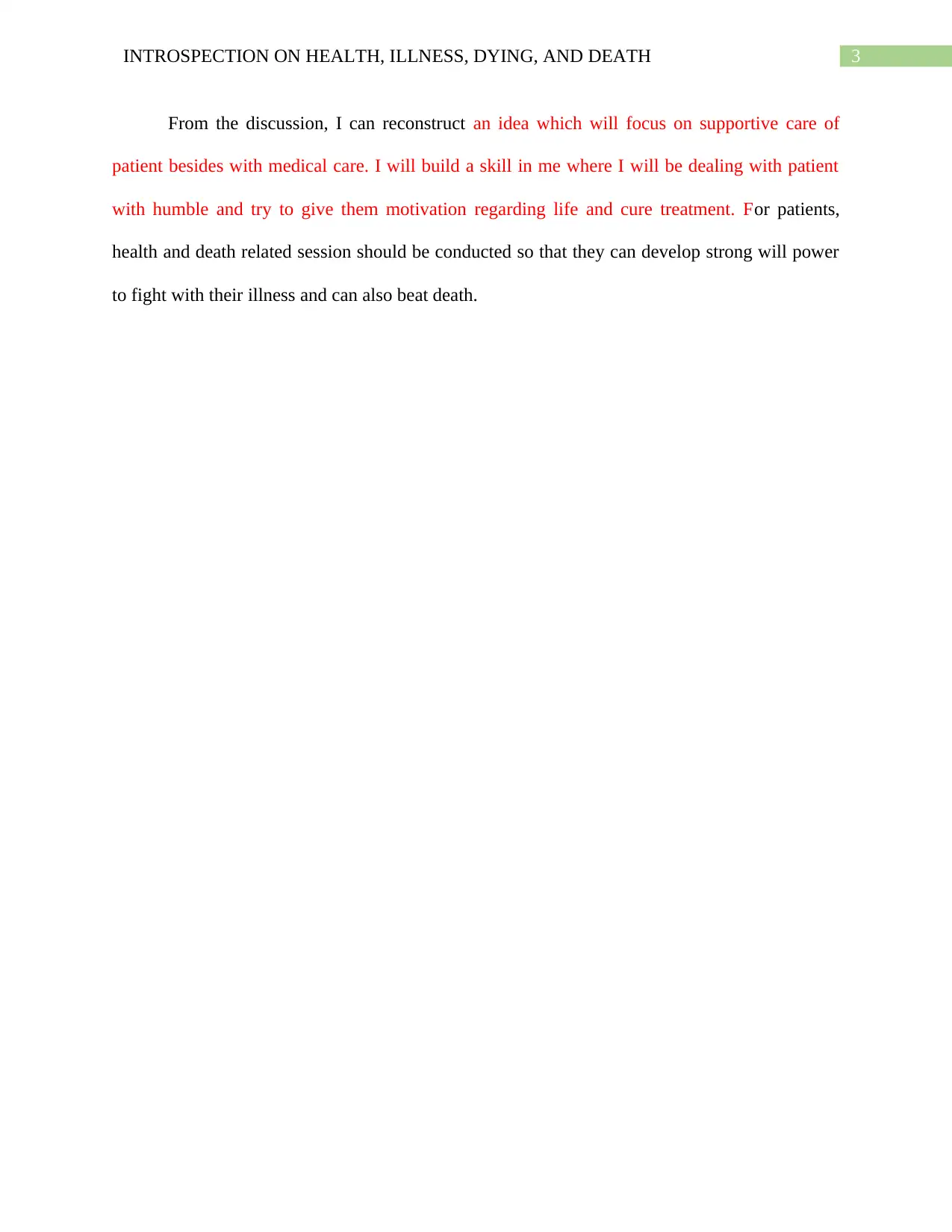
3INTROSPECTION ON HEALTH, ILLNESS, DYING, AND DEATH
From the discussion, I can reconstruct an idea which will focus on supportive care of
patient besides with medical care. I will build a skill in me where I will be dealing with patient
with humble and try to give them motivation regarding life and cure treatment. For patients,
health and death related session should be conducted so that they can develop strong will power
to fight with their illness and can also beat death.
From the discussion, I can reconstruct an idea which will focus on supportive care of
patient besides with medical care. I will build a skill in me where I will be dealing with patient
with humble and try to give them motivation regarding life and cure treatment. For patients,
health and death related session should be conducted so that they can develop strong will power
to fight with their illness and can also beat death.
Paraphrase This Document
Need a fresh take? Get an instant paraphrase of this document with our AI Paraphraser
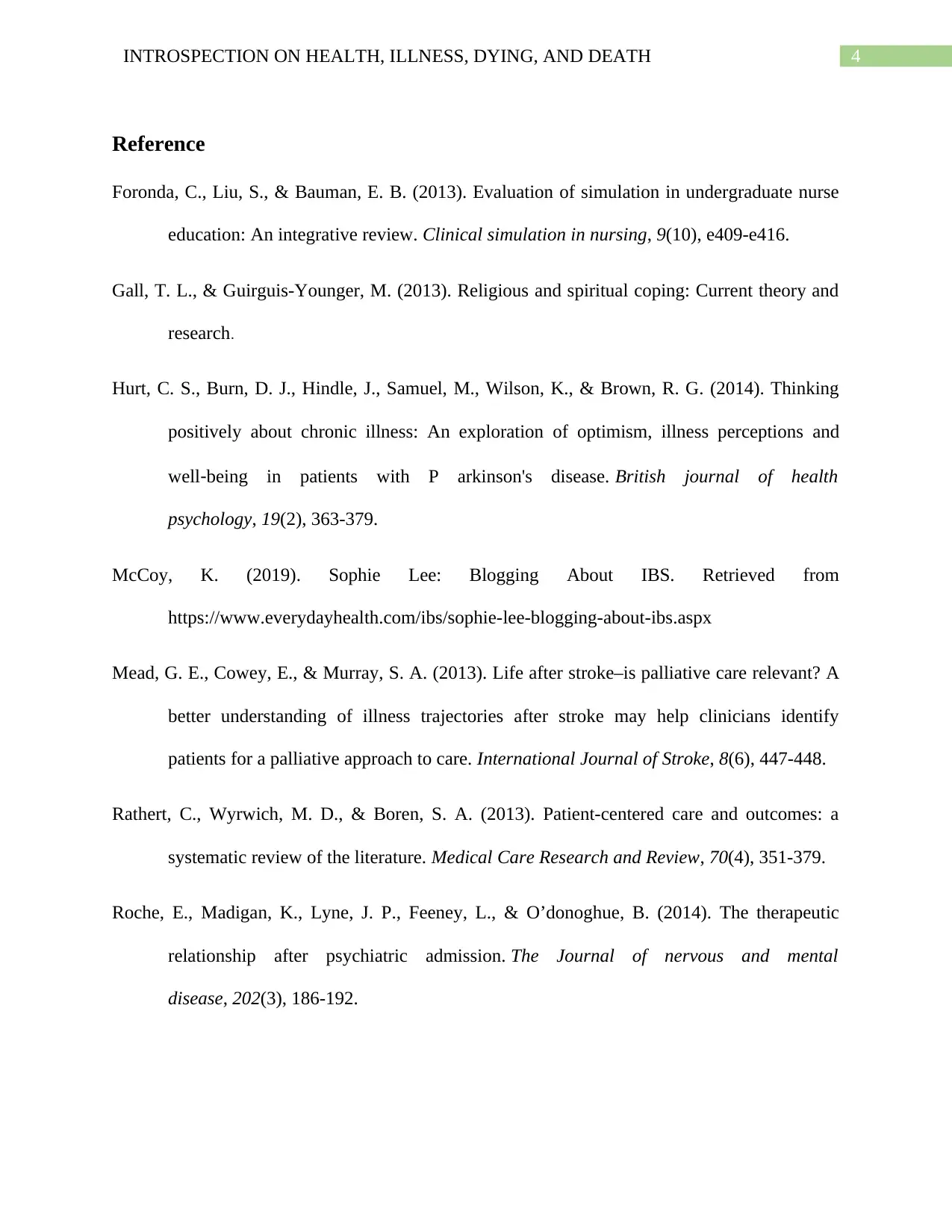
4INTROSPECTION ON HEALTH, ILLNESS, DYING, AND DEATH
Reference
Foronda, C., Liu, S., & Bauman, E. B. (2013). Evaluation of simulation in undergraduate nurse
education: An integrative review. Clinical simulation in nursing, 9(10), e409-e416.
Gall, T. L., & Guirguis-Younger, M. (2013). Religious and spiritual coping: Current theory and
research.
Hurt, C. S., Burn, D. J., Hindle, J., Samuel, M., Wilson, K., & Brown, R. G. (2014). Thinking
positively about chronic illness: An exploration of optimism, illness perceptions and
well‐being in patients with P arkinson's disease. British journal of health
psychology, 19(2), 363-379.
McCoy, K. (2019). Sophie Lee: Blogging About IBS. Retrieved from
https://www.everydayhealth.com/ibs/sophie-lee-blogging-about-ibs.aspx
Mead, G. E., Cowey, E., & Murray, S. A. (2013). Life after stroke–is palliative care relevant? A
better understanding of illness trajectories after stroke may help clinicians identify
patients for a palliative approach to care. International Journal of Stroke, 8(6), 447-448.
Rathert, C., Wyrwich, M. D., & Boren, S. A. (2013). Patient-centered care and outcomes: a
systematic review of the literature. Medical Care Research and Review, 70(4), 351-379.
Roche, E., Madigan, K., Lyne, J. P., Feeney, L., & O’donoghue, B. (2014). The therapeutic
relationship after psychiatric admission. The Journal of nervous and mental
disease, 202(3), 186-192.
Reference
Foronda, C., Liu, S., & Bauman, E. B. (2013). Evaluation of simulation in undergraduate nurse
education: An integrative review. Clinical simulation in nursing, 9(10), e409-e416.
Gall, T. L., & Guirguis-Younger, M. (2013). Religious and spiritual coping: Current theory and
research.
Hurt, C. S., Burn, D. J., Hindle, J., Samuel, M., Wilson, K., & Brown, R. G. (2014). Thinking
positively about chronic illness: An exploration of optimism, illness perceptions and
well‐being in patients with P arkinson's disease. British journal of health
psychology, 19(2), 363-379.
McCoy, K. (2019). Sophie Lee: Blogging About IBS. Retrieved from
https://www.everydayhealth.com/ibs/sophie-lee-blogging-about-ibs.aspx
Mead, G. E., Cowey, E., & Murray, S. A. (2013). Life after stroke–is palliative care relevant? A
better understanding of illness trajectories after stroke may help clinicians identify
patients for a palliative approach to care. International Journal of Stroke, 8(6), 447-448.
Rathert, C., Wyrwich, M. D., & Boren, S. A. (2013). Patient-centered care and outcomes: a
systematic review of the literature. Medical Care Research and Review, 70(4), 351-379.
Roche, E., Madigan, K., Lyne, J. P., Feeney, L., & O’donoghue, B. (2014). The therapeutic
relationship after psychiatric admission. The Journal of nervous and mental
disease, 202(3), 186-192.
1 out of 5
Related Documents
Your All-in-One AI-Powered Toolkit for Academic Success.
+13062052269
info@desklib.com
Available 24*7 on WhatsApp / Email
![[object Object]](/_next/static/media/star-bottom.7253800d.svg)
Unlock your academic potential
Copyright © 2020–2026 A2Z Services. All Rights Reserved. Developed and managed by ZUCOL.





